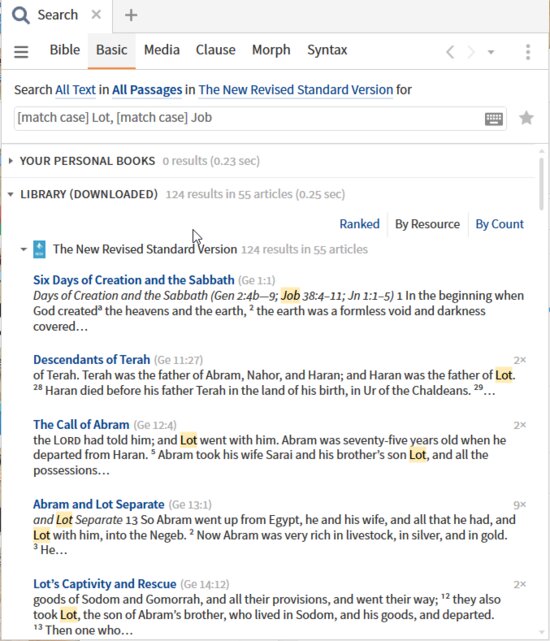Docx files for personal book: Verbum 9 part 1; Verbum 9 part 2; Verbum 9 part 3; Verbum 9 part 4; Verbum 9 part 5; How to use the Verbum Lectionary and Missal; Verbum 8 tips 1-30; Verbum 8 tips 31-49
Reading lists: Catholic Bible Interpretation
Please be generous with your additional details, corrections, suggestions, and other feedback. This is being built in a .docx file for a PBB which will be shared periodically.
Previous post: Verbum Tip 7q Next post: Verbum Tip 7s
Term modifier: mark sensitivity
From Verbum Help:[quote]
Mark Sensitivity
Terms can be modified to count diacritic marks as significant or not significant for matching. Defaults vary by language. For example, English generally doesn’t have diacritic marks, so by default typing resume will match resume, resumé, and résumé. To override this default, specify a marks matching term modifier into the query.
All languages will support:
• [match marks] — Makes all non-spacing marks significant. Equivalent to version 3 “marks()”
• [match nomarks] — Ignores all non-spacing marks, regardless of language defaults
• [match exact] or [match all] — Matches exactly what you type
Languages with capital letters and lowercase letters will support:
• [match case] — Matches sensitive to capital/lowercase letters
Some languages have special mark-matching rules.
Hebrew/Aramaic
By default, Hebrew is not sensitive to any marks in the query, except for sin and shin dots, which are like the slash in Swedish ø: they are different letters. (This can be overridden with [match nomarks].) Additionally, maqqef and space are treated as equivalent.
• [match vowels] — Vowel diacritics in the query will be treated as significant for matching
• [match dagesh] — Dagesh in the query is significant
• [match accents] — Cantillation diacritics (te’amim) will be treated as significant
• [match massora] — Matches the masora circle
• [match rafe] — Matches accent rafe
• [match critical] — Matches text-critical marks
• [match pointed] — Same as [match vowels,dagesh,massora,rafe,critical]
• [match cantillated] — Same as [match vowels,dagesh,massora,rafe,critical,accents]
• [match holem-haser] — Differentiates between holem and holem haser
Greek
By default, Greek searches are not sensitive to any marks in the query.
• [match iota-subscript] — Subscripted iota is significant
• [match dieresis] — Dieresis mark is significant
• [match breathing] — Rough and smooth breathing marks are significant
• [match accents] — Includes all accenture marks
• [match technical-marks] — Includes technical diacritics
• [match unaccented] — Doesn’t count marks except for rough and smooth breathing
• [match polytonic]
Syriac
By default, Syriac is not sensitive to any marks.
• [match vowels]
• [match silent]
• [match begadkephat]
• [match grammar]
• [match barrekh]
• [match music]
• [match accents]
• [match dialect]
• [match abbrev][1]
[match case] Lot is equivalent to setting the panel menu search option “Match case” on with the search argument Lot.

Essentially the text term modifiers should be treated as:
- Language modifiers are rarely used by the average user. If you need one you will know it, and can look up the details.
- Search fields are available via drop down menu or by text term modifiers – develop your own preference
- Mark sensitivity modifiers with the exception of match case are used primarily by language students and scholars. Know that they exist but assume you’ll need to look up the details.
- On the other hand, if you are going to need them, play with them as the documentation currently is sometimes misleading.
[1] Verbum Help (Bellingham, WA: Faithlife, 2018).